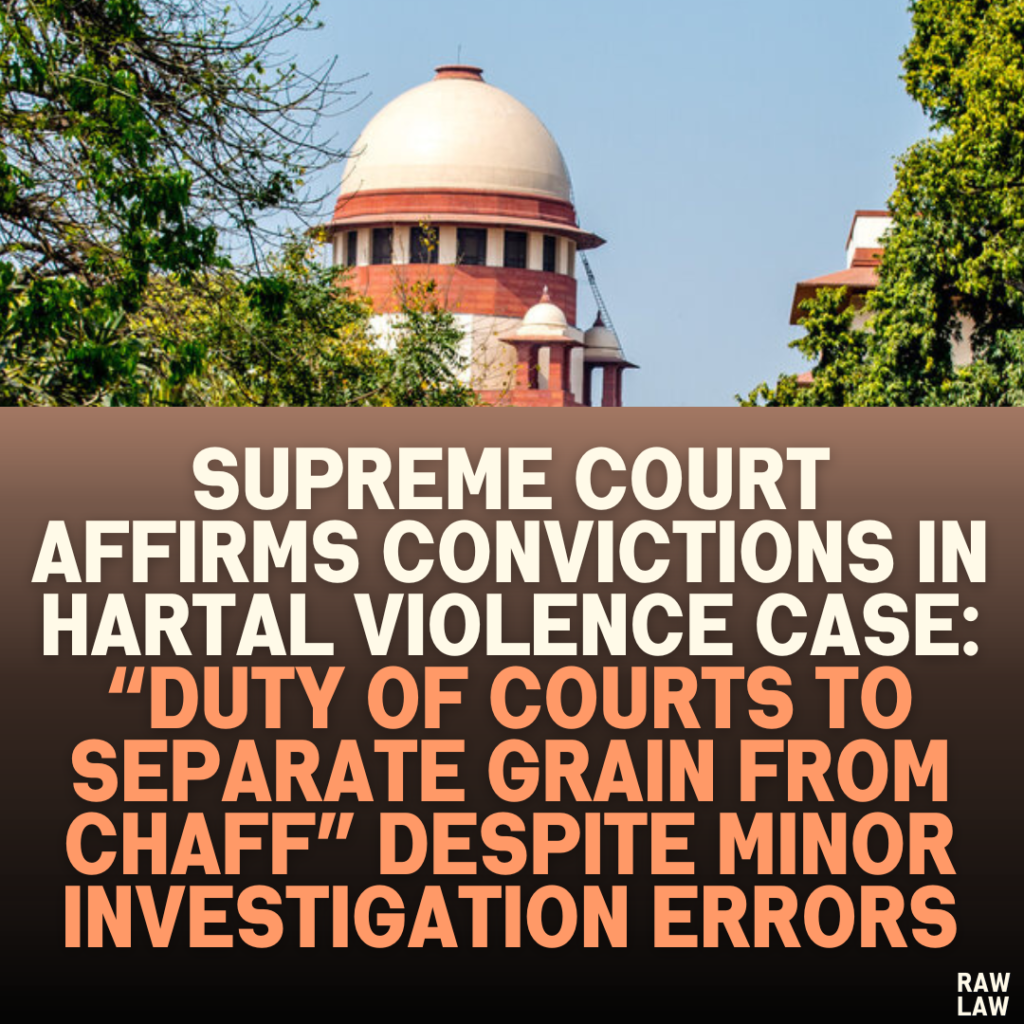Court’s Decision:
The Supreme Court dismissed the appeal filed by the convicted accused against the High Court of Kerala’s judgment in the Hartal violence case. The Court upheld the convictions of A1 to A3, A11, and A12 for murder under Section 302 read with 149 of the IPC, and the conviction of A3 under Section 5 of the Explosive Substances Act, 1908. The Court observed that minor contradictions in witness statements and defects in the investigation did not vitiate the prosecution’s case.
Facts:
On 1 March 2002, during a hartal called by the RSS/VHP, violent clashes occurred between their members and CPI(M) activists. A group of 11 RSS workers fled to the Meloor river to escape a CPI(M) mob. Around midnight, the mob attacked them with deadly weapons. While most escaped, Sunil and Sujeesh were killed.
- Initial Actions: An FIR was registered on 2 March 2002, naming the accused. Investigations led to arrests, and the weapons used in the murders were recovered.
- Prosecution Evidence: Postmortem reports showed that both victims died due to injuries inflicted on vital organs. Eyewitnesses described the attack and identified the accused.
- Trial Court Findings: All accused were convicted under Sections 143, 147, 506(ii), and 302 r/w 149 of IPC, with some also convicted under Section 5 of the Explosive Substances Act.
- High Court Findings: On appeal, the High Court acquitted A4 to A10, A13, and A14, while upholding the convictions of A1 to A3, A11, and A12. It noted the consistency of eyewitness accounts and corroboration by medical evidence.
Issues:
- Whether contradictions in witness testimonies undermine the prosecution’s case.
- Whether the principle of “falsus in uno, falsus in omnibus” applies to this case.
- Whether defective investigation and recovery of evidence affect the credibility of the case.
- Whether the High Court’s findings were supported by evidence.
Petitioner’s Arguments:
- FIR Issues: The FIR was ante-timed, containing interpolations such as the addition of A14 and A15. It mentioned Sunil’s death at 3 a.m., though his body was found at 7:30 a.m.
- Witness Contradictions: Eyewitnesses gave inconsistent accounts, and their statements were influenced by political rivalry.
- Defective Recovery: The weapons’ recovery was based on questionable disclosure statements, and no forensic evidence linked them to the accused.
- Political Bias: The prosecution exaggerated the case to implicate the accused due to political enmity between RSS and CPI(M).
Respondent’s Arguments:
- The High Court’s judgment was well-reasoned and based on consistent testimonies from eyewitnesses.
- Minor contradictions in witness statements do not discredit their core accounts.
- Defective investigation does not negate credible evidence like postmortem findings, eyewitness statements, and recovered weapons.
Analysis of the Law:
- Contradictions in Witness Statements:
- The Court relied on Rammi v. State of MP and Birbal Nath v. State of Rajasthan to establish that minor inconsistencies in witness statements do not impair their overall credibility.
- The principle “falsus in uno, falsus in omnibus” (false in one thing, false in everything) does not apply to Indian criminal law. This was reaffirmed in cases like Ram Vijay Singh v. State of UP and Ilangovan v. State of Tamil Nadu.
- Defective Investigation:
- Referring to Paras Yadav v. State of Bihar, the Court emphasized that a flawed investigation does not automatically exonerate the accused if sufficient evidence exists.
- Despite lapses, the testimony of eyewitnesses and medical evidence provided reliable grounds for conviction.
- Role of Eyewitnesses:
- The Court evaluated the testimonies of PW1, PW2, and PW4, concluding that their accounts were consistent and corroborated. It noted that enmity between the parties did not render their evidence unreliable.
- Recovery of Weapons:
- The Court upheld the High Court’s reasoning that recovery under Section 27 of the Evidence Act was credible. The absence of forensic analysis of the jeep and other procedural lapses were not material.
- Explosive Substances Act:
- A3’s act of throwing a bomb established unlawful possession, justifying his conviction under Section 5 of the Explosive Substances Act.
Precedent Analysis:
The Court applied the following key precedents:
- Rammi v. State of MP (1999): Minor inconsistencies in evidence do not necessarily impair a witness’s credibility.
- Paras Yadav v. State of Bihar (1999): Defective investigations do not exonerate the accused if corroborative evidence exists.
- Raju v. State of Tamil Nadu (2012): Related or interested witnesses’ testimony can be relied upon after careful scrutiny.
Court’s Reasoning:
- Witness Testimonies: The Court found the depositions of PW1, PW2, and PW4 consistent and trustworthy. Their accounts corroborated medical evidence and the recovery of weapons.
- FIR Discrepancies: The Court dismissed the claims of an ante-timed FIR, noting that the timeline discrepancies were minor and did not affect the overall case.
- Defective Investigation: While the investigation was not flawless, the prosecution’s evidence was strong enough to sustain the convictions.
Conclusion:
The Supreme Court dismissed the appeal, affirming the High Court’s judgment. It emphasized the duty of courts to “separate the grain from the chaff” and focus on credible evidence rather than procedural lapses or minor contradictions.
Implications:
This judgment reinforces the principle that defective investigations and minor inconsistencies in witness accounts do not vitiate the prosecution’s case if reliable evidence exists. It highlights the judiciary’s role in ensuring justice while balancing the rights of the accused and societal interests.




Pingback: Bombay High Court Quashes Tribunal’s Decision Invalidating District Information Officer Recruitment; Upholds Selection Committee’s Discretion and Rejects Post-Participation Challenges - Raw Law